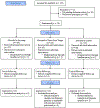Results of a pilot study examining the effect of positive psychology interventions on cannabis use and related consequences
- PMID: 37263491
- PMCID: PMC10875633
- DOI: 10.1016/j.cct.2023.107247
Results of a pilot study examining the effect of positive psychology interventions on cannabis use and related consequences
Abstract
Background: Young adults experience high rates of cannabis use and consequences. Cross-sectional work has linked positive psychological constructs (e.g., savoring) to less cannabis use and consequences, and positive psychological interventions (PPIs) have shown promise in targeting other substance use behaviors. This pilot study sought to provide an initial test of PPIs to reduce young adult cannabis use and consequences.
Methods: Adults (18-25 years old) who endorsed at least weekly past-month cannabis use (N = 59, 69.6% men, 41.1% White) reported their baseline cannabis use and consequences. Participants were randomized to complete one of three daily exercises (Savoring, Three Good Things, or a control) along with daily text message surveys for two weeks, then completed a follow-up survey at the end of the two weeks.
Results: Paired samples t-tests indicated that participants in the Three Good Things group showed medium to large reductions in frequency of weekly cannabis use (p = .08, gav = -0.57) and cannabis-associated consequences (p = .08, gav = -0.57) from baseline to follow-up. In the Savoring and control groups, there were not significant changes in frequency of weekly cannabis use (Savoring: p = .39, gav = 0.20; Control: p = .96, gav = 0.01) nor cannabis-associated consequences (Savoring: p = .84, gav = 0.05; Control: p = .45, gav = -0.18). Participants in both positive psychology conditions reported the exercises were easy to complete, providing evidence for acceptability.
Discussion: Results provide initial support for the feasibility and potential promise of a text-message based PPI as a harm reduction approach for cannabis users. A larger clinical trial is warranted to test the effects of such interventions with adequate statistical power.
Keywords: Cannabis use; Cannabis-associated consequences; Positive psychology interventions; Savoring; Three good things; Young adults.
Copyright © 2023. Published by Elsevier Inc.
Conflict of interest statement
Declaration of Competing Interest The authors report no conflicts of interest.
Figures
Similar articles
-
The Role of Savoring in Young Adult Cannabis Use and Associated Consequences: A Replication Study.J Psychoactive Drugs. 2024 Nov-Dec;56(5):681-688. doi: 10.1080/02791072.2023.2278583. Epub 2023 Nov 10. J Psychoactive Drugs. 2024. PMID: 37947346
-
Positive psychological interventions on alcohol use and consequences: Pilot randomized trial in a young adult cannabis-using sample.J Subst Use Addict Treat. 2024 Mar;158:209241. doi: 10.1016/j.josat.2023.209241. Epub 2023 Dec 5. J Subst Use Addict Treat. 2024. PMID: 38056630 Clinical Trial.
-
Do self-administered positive psychology exercises work in persons in recovery from problematic substance use? An online randomized survey.J Subst Abuse Treat. 2019 Apr;99:16-23. doi: 10.1016/j.jsat.2019.01.006. Epub 2019 Jan 8. J Subst Abuse Treat. 2019. PMID: 30797389
-
Digital Interventions for Recreational Cannabis Use Among Young Adults: Systematic Review, Meta-Analysis, and Behavior Change Technique Analysis of Randomized Controlled Studies.J Med Internet Res. 2024 Apr 17;26:e55031. doi: 10.2196/55031. J Med Internet Res. 2024. PMID: 38630515 Free PMC article.
-
Development and evaluation of a de-escalation training intervention in adult acute and forensic units: the EDITION systematic review and feasibility trial.Health Technol Assess. 2024 Jan;28(3):1-120. doi: 10.3310/FGGW6874. Health Technol Assess. 2024. PMID: 38343036 Free PMC article.
Cited by
-
The Role of Savoring in Young Adult Cannabis Use and Associated Consequences: A Replication Study.J Psychoactive Drugs. 2024 Nov-Dec;56(5):681-688. doi: 10.1080/02791072.2023.2278583. Epub 2023 Nov 10. J Psychoactive Drugs. 2024. PMID: 37947346
-
The Protective Role of Savoring on Coping Motives for Cannabis Use and Consequences.J Psychoactive Drugs. 2025 Aug 6:1-11. doi: 10.1080/02791072.2025.2537043. Online ahead of print. J Psychoactive Drugs. 2025. PMID: 40767461
-
A randomized feasibility study of a positive psychology journaling intervention to support recovery from substance-use disorders.J Subst Use Addict Treat. 2024 Sep;164:209410. doi: 10.1016/j.josat.2024.209410. Epub 2024 May 25. J Subst Use Addict Treat. 2024. PMID: 38802048 Clinical Trial.
-
Telehealth tDCS to reduce cannabis use: A pilot RCT in multiple sclerosis as a framework for generalized use.Drug Alcohol Depend. 2025 Jul 1;272:112706. doi: 10.1016/j.drugalcdep.2025.112706. Epub 2025 May 15. Drug Alcohol Depend. 2025. PMID: 40378662 Clinical Trial.
References
-
- Akhtar Miriam, and Boniwell Ilona. 2010. “Applying positive psychology to alcohol-misusing adolescents.” Groupwork 20 (3):6–31. doi: 10.1921/gpwk.v20i3.707. - DOI
Publication types
MeSH terms
Grants and funding
LinkOut - more resources
Full Text Sources
Miscellaneous



